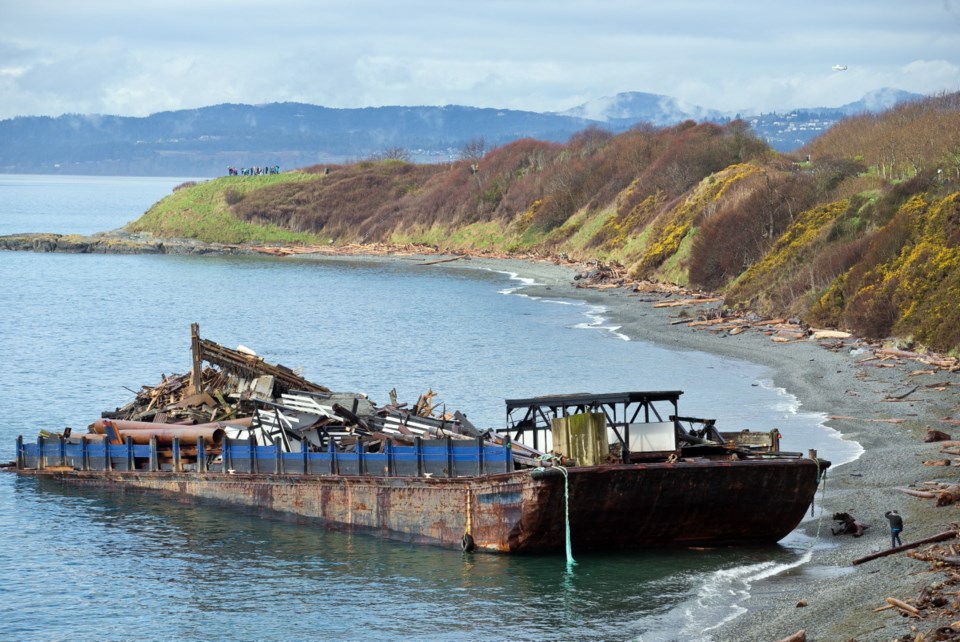 I toddled down to Clover Point, saw the barge on the beach, leapt to the logical conclusion: the Americans had landed.
I toddled down to Clover Point, saw the barge on the beach, leapt to the logical conclusion: the Americans had landed.
It was either A) the first wave of refugees fleeing the Trumpism that has gripped ’Merica, or B) our neighbours had reached the breaking point over Victoria’s lack of sewage treatment, decided to go D-Day on us.
I initially tilted toward the former option, seeing as the Google search “how to move to Canada” spiked over 1,000 per cent after Trump’s triumphs on Super Tuesday. But then I realized that no, given the choice between flight or fight, Americans lean toward the latter.
So what we saw off Dallas Road this week wasn’t a refugee ship like the four Fujianese ones that freaked out Vancouver Islanders in 1999, or the two Sri Lankan rustbuckets that showed up off our shores six years ago, but a Saving Private Ryan-type landing craft. What we call Clover Point, they call Omaha Beach.
This should not surprise us. We have had plenty of warnings:
• Washington State legislators are looking at restricting state employees’ travel to Victoria, due to what the bill’s sponsor refers to as our “backsliding” on the sewage-treatment issue. The bill will go to the state senate Thursday.
• In a Feb. 9 Times Colonist op-ed, former premier Mike Harcourt referred to a 2014 letter in which Washington Gov. Jay Inslee chided Premier Christy Clark. “It is now more than 20 years since your province agreed to implement wastewater treatment in Greater Victoria,” the governor’s letter reminded her.
It was Harcourt who promised in 1993 that Victoria would have sewage treatment by 2002.
• Last August, the Seattle Times called for a tourism boycott, saying we had failed to live up to the 1993 B.C.-Washington agreement.
“The failure is an embarrassment for stately Victoria, and it undermines the rigorous work to clean up Puget Sound,” the editorial said.
• In March 2015, congressman Derek Kilmer lit into a group of Canadian parliamentarians visiting Washington, D.C. Kilmer called for an end to the dumping of raw sewage into “our shared waters.”
The Seattle Post-Intelligencer’s Joel Connelly chimed in at that time, too, hammering us for our foot-dragging — not surprising, since it has been more than a quarter century since he first wrote “the B.C. capital believes in using an international waterway as its toilet.”
The Americans’ position will be dismissed as hyperbole by the large (or at least noisy) number of Victorians who remain unconvinced of the need for more sewage treatment at all. They argue this slow-moving train is being powered by politics, not science.
Be that as it may, a political problem is still a problem. U.S. patience has run out. The landing barges have hit the beach, the anschluss has begun and there’s nothing we can do about it.
We plump and peaceful Vancouver Islanders are not well-suited to parrying an invasion. Our last regular army unit, the Princess Pats, pulled out in 1993. Vancouver Island hasn’t endured naval bombardment since The War on View Royal, in which HMCS Regina accidentally fired an unarmed, 20-kilogram chaff rocket three kilometres across the harbour and into the back shed at Pete’s Tent and Awning in 1996.
As for air assaults, Greater Victoria hasn’t had to worry about a blitzkrieg since 1942, when a twin-engined Hampden aircraft based at the Pat Bay Airport dropped five practice bombs on Cordova Bay (no one was hurt, despite one of the bombs plunging straight through a roof and into the kitchen sink as a woman washed her dishes).
The rest of the Island hasn’t had to fuss since the last years of the Second World War, when a few of the 9,000 balloon-borne incendiary bombs that Japan sent drifting toward North America fell in our forests. (The B.C. Aviation Museum by the Victoria airport has a replica of one of the devices.)
So, no, Winston, don’t expect any of that “we shall fight them on the beaches” nonsense from us.
We’ll just talk them to death, instead.



